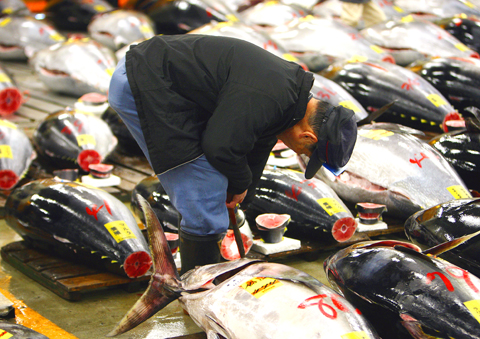A huge bluefin tuna was sold for US$176,000 in the first auction of the year at a Tokyo fish market yesterday, amid growing pressure on Japan to help save the threatened fish.
The 232.6kg bluefin tuna — caught off Japan’s northern region of Aomori — fetched a winning bid of ¥16.28 million (US$176,000), said an official at the Tsukiji fish market.
It was the second-biggest such bid yet, after a record ¥20.02 million paid for a bluefin tuna in 2001, the official said.

PHOTO: BLOOMBERG
The fish was bought by a pair of Japanese and Hong Kong sushi restaurant owners who had also made a joint top bid for a bluefin tuna in the first auction of last year at Tsukiji, the world’s biggest fish market.
“I want to make an impact on the Japanese and Hong Kong economies by buying the highest-priced tuna,” the Sankei Shimbun daily’s Web site quoted the Hong Kong sushi restaurant owner as saying.
The auction came amid worries among Japanese, the world’s biggest consumers of bluefin tuna, about growing calls for a trade ban for the fish, which environmentalists warn is on its way to extinction.
In a move to protect the species, an international body meeting in Brazil in November agreed to cut the allowable bluefin tuna catch in the eastern Atlantic and Mediterranean by about 40 percent this year compared with last year.
Japan, which consumes more than 80 percent of tuna caught in the Mediterranean, endorsed the proposal and agreed to reduce its own catch quota accordingly.
“Tuna is a precious food, which is the core of Japanese food culture,” said Keiichi Suzuki, president of the Tsukiji fish market, where 2,280 tuna fish were auctioned yesterday.
“We would like to provide a stable supply while saving resources,” he said as a crowd of bidders clapped to celebrate this year’s first auction, with an opening bell echoing through the pre-dawn market.

A magnitude 7.0 earthquake struck off Yilan at 11:05pm yesterday, the Central Weather Administration (CWA) said. The epicenter was located at sea, about 32.3km east of Yilan County Hall, at a depth of 72.8km, CWA data showed There were no immediate reports of damage. The intensity of the quake, which gauges the actual effect of a seismic event, measured 4 in Yilan County area on Taiwan’s seven-tier intensity scale, the data showed. It measured 4 in other parts of eastern, northern and central Taiwan as well as Tainan, and 3 in Kaohsiung and Pingtung County, and 2 in Lienchiang and Penghu counties and 1

FOREIGN INTERFERENCE: Beijing would likely intensify public opinion warfare in next year’s local elections to prevent Lai from getting re-elected, the ‘Yomiuri Shimbun’ said Internal documents from a Chinese artificial intelligence (AI) company indicated that China has been using the technology to intervene in foreign elections, including propaganda targeting Taiwan’s local elections next year and presidential elections in 2028, a Japanese newspaper reported yesterday. The Institute of National Security of Vanderbilt University obtained nearly 400 pages of documents from GoLaxy, a company with ties to the Chinese government, and found evidence that it had apparently deployed sophisticated, AI-driven propaganda campaigns in Hong Kong and Taiwan to shape public opinion, the Yomiuri Shimbun reported. GoLaxy provides insights, situation analysis and public opinion-shaping technology by conducting network surveillance

Taiwan is gearing up to celebrate the New Year at events across the country, headlined by the annual countdown and Taipei 101 fireworks display at midnight. Many of the events are to be livesteamed online. See below for lineups and links: Taipei Taipei’s New Year’s Party 2026 is to begin at 7pm and run until 1am, with the theme “Sailing to the Future.” South Korean girl group KARA is headlining the concert at Taipei City Hall Plaza, with additional performances by Amber An (安心亞), Nick Chou (周湯豪), hip-hop trio Nine One One (玖壹壹), Bii (畢書盡), girl group Genblue (幻藍小熊) and more. The festivities are to

Auckland rang in 2026 with a downtown fireworks display launched from New Zealand’s tallest structure, Sky Tower, making it the first major city to greet the new year at a celebration dampened by rain, while crowds in Taipei braved the elements to watch Taipei 101’s display. South Pacific countries are the first to bid farewell to 2025. Clocks struck midnight in Auckland, with a population of 1.7 million, 18 hours before the famous ball was to drop in New York’s Times Square. The five-minute display involved 3,500 fireworks launched from the 240m Sky Tower. Smaller community events were canceled across New Zealand’s